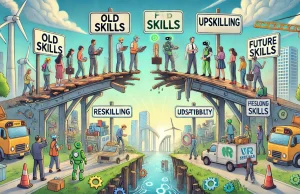In recent years, the notion of the traditional office has been revolutionized. Cubicles and conference rooms have given way to virtual workspaces, where employees engage with their tasks and teams from the comfort of their homes or co-working spaces. This seismic shift has introduced new psychological dimensions to our work, compelling both individuals and organizations to embrace a growth mindset for success in remote work environments.
A growth mindset, a term coined by psychologist Carol Dweck, is the belief that one’s abilities and intelligence can be developed with dedication and hard work. In remote work settings, embodying a growth mindset means seeing challenges as opportunities for learning rather than insurmountable obstacles. For remote workers, the physical isolation from peers can dampen the exchange of ideas and immediate feedback that often spurs personal development. To navigate these waters, it’s crucial to leverage digital communication tools deliberately and effectively, nurturing relationships and exchanging constructive criticism as one would in person.
The virtual office also presents unique hurdles for team building and collaboration. However, it’s precisely these challenges that can spur innovation. With a growth mindset, remote teams can harness diverse perspectives from across the globe to fuel creativity and problem-solving. Establishing regular virtual check-ins, creating digital ‘water cooler’ spaces, and celebrating team achievements digitally can foster a sense of unity and shared purpose.
For employers, cultivating a culture conducive to a growth mindset is vital. This involves providing educational resources, encouraging mentorship programs, and offering platforms for employee recognition. With dispersed teams, leaders must be intentional about creating an environment that not only acknowledges achievement but also incentivizes the process of learning and adaptation. This investment in fostering employee growth translates to the overall resilience and agility of the organization.
As we reflect on the transformative potential of remote work, it’s clear that the psychological shifts required are not just about adjusting to a new set of tools or routines. It’s about a fundamental change in the way we view our professional growth. By embracing a growth mindset, remote workers and organizations can unlock a level of flexibility and resilience that traditional office settings seldom offered. In doing so, we reframe the narrative around remote work, seeing it not as a limitation, but as a liberating path to continuous improvement and innovation.
The journey of adapting to remote work is ongoing, and the psychological landscape continues to evolve. The key for both individuals and organizations is to remain open, curious, and committed to growth. Those who do will find that the rewards of remote work far surpass the challenges. As we continue to navigate these shifts, the evolution of the growth mindset in remote work environments remains a beacon for a brighter, more adaptive future in the professional world.


















![From TAOLabs: A New, Simplified Way to Learn in the Age of Chaos [30m60h90d] From TAOLabs: A New, Simplified Way to Learn in the Age of Chaos](https://theworktimes.com/wp-content/uploads/2025/05/ChatGPT-Image-May-13-2025-01_11_22-AM-238x178.png)








